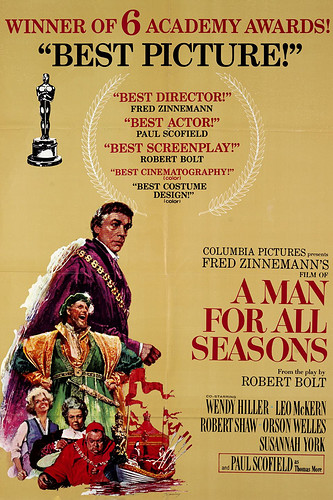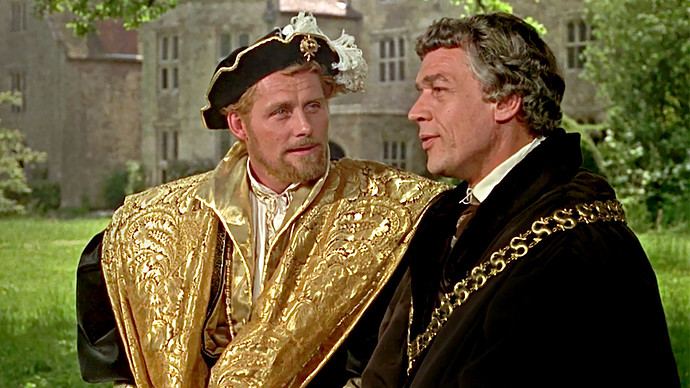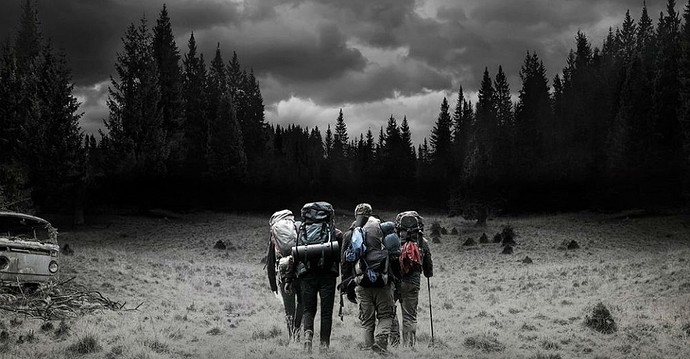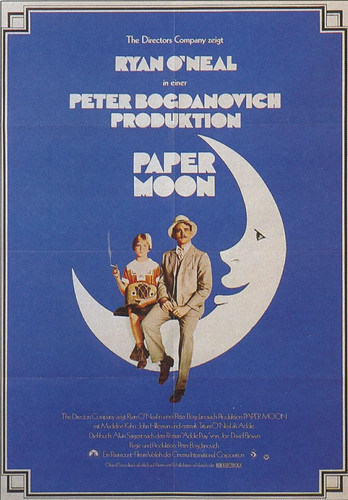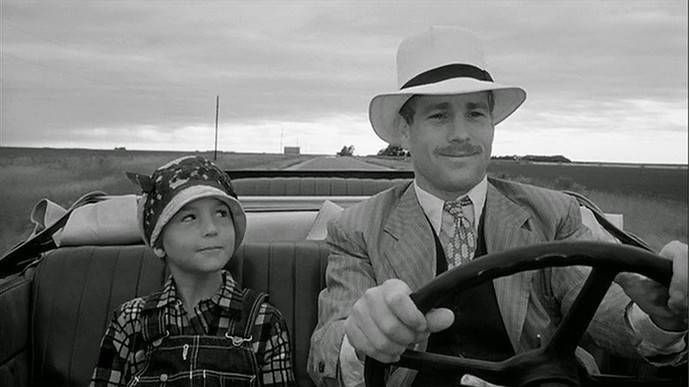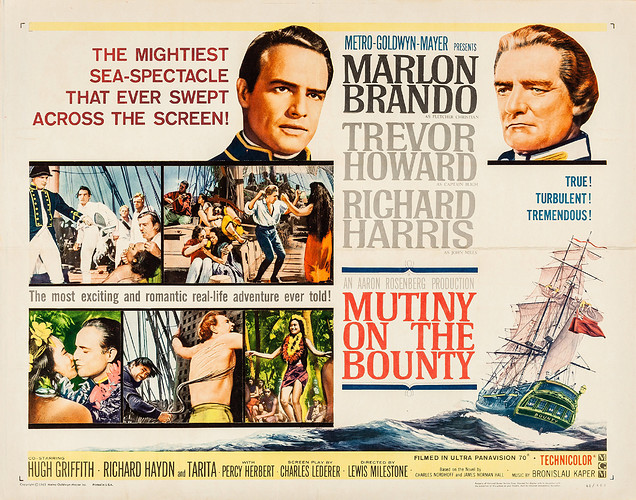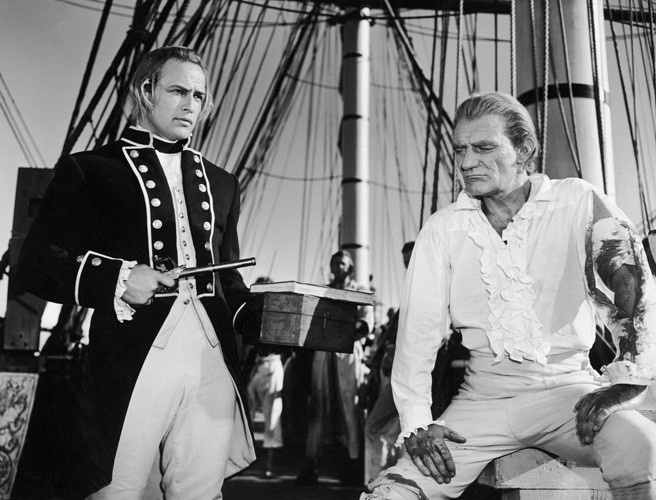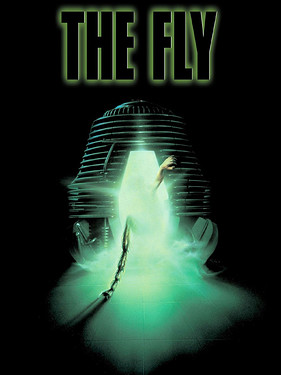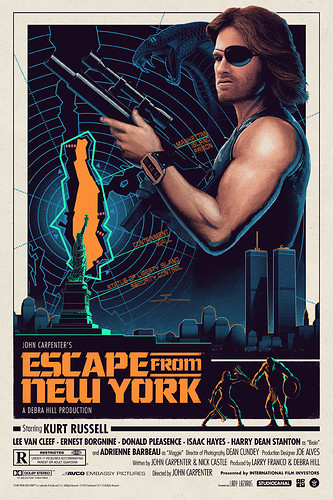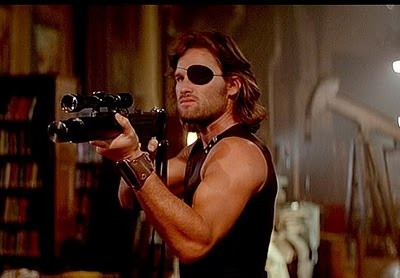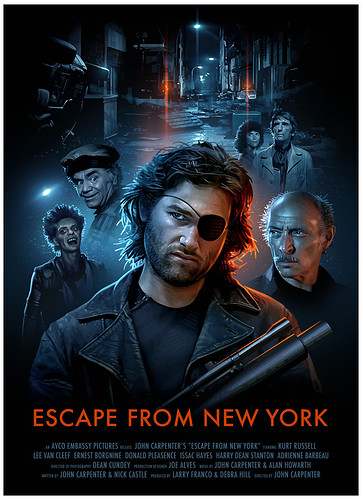Yes, the Years of Lead set for sure. It was so strange seeing Merli without his trademark mustache, but it did make him look younger.
Just finished up Sergio Sollima’s Swashbuckling epic Il Corsaro Nero (The Black Corsair) starring Kabir Bedi and Mel Ferrer. The swordplay wasn’t as graceful as the types done by Ronald Coleman, Errol Flynn, and Douglas Fairbanks Sr., but still highly effective in suspense and action. A highly entertaining film.
Watched the second half of Philip Mora’s Mad Dog Morgan tonight. Excellent movie, I went in thinking it’d be something similar to Ned Kelley, but it really exceeded my expectations.
Enjoyed a bit of Neo-Noir with a re-watch of
The Grifters (Frears/1990)
Excellent Jim Thompson adaptation.
A truly wonderful film: beautifully acted, scripted, directed, and shot in glorious locations throughout the UK.
The performance from Paul Scofield, as historical figure, Sir Thomas More, is exemplary…
The Ritual (2017, David Bruckner)
After the tragic and violent death of a mutual friend, four young Brits reunite for a survival trip in the Swedish woods. It’s supposed to be a no man’s land, but soon it becomes clear that they’re followed by a mysterious entity.
Director David Bruckner had done a few shorts and segments of portmanteau movies but this is his first feature length movie. It’s a good one. The emphasis is more on character building and atmosphere than on the butchery and excessive bloodletting that have infested the horror genre in the last few decades. Excellent performances by the four lead actors are also assets.
There are a few shortcomings though: the first half, when the menacing force remains unidentified, is so strong and promising that things become less compelling once we start learning more about these destructive forces hidden in the woods. And this quasi religious, explicit ending is a real let-down.
Nevertheless recommended to horror aficionados
***½ out of 5
Side note:
The film is not too friendly about Belgium. A piece of conversation (the guys are discussing where to spend their holidays):
First person: Belgium? Mate, no one’s ever been to Belgium by choice. What are you on about? What’s in Belgium?
Second person: Beers that are, like, 42% or something.
Stuck with 1990, which was a pretty good year for Hollywood movies by the way.
This time around it was the Coen Brothers.
Miller’s Crossing (Coen / 1990)
Not my favourite Coen’s film but pretty solid with some nice moments and showing where they would be starting to head with Barton Fink.
Personally, I’ve always enjoyed the second part kinda more even if the first one is a classic and technically the better movie. The sequel is a Frankenheimer film, so it’s different, kind of trashier and less artsy, but good nonetheless. I dunno, I have a soft for Frankenheimer even if he was a blockbuster kinda director.
It’s on my watchlist, I’m gonna watch it the moment I get to that part of my watchlist pile and I’m done with the Euro-horror genre for the time being.
Scarlet Street (1945) - Director: Fritz Lang - 6/10.
La noche de Walpurgis (1971) - Director: León Klimovsky - 7/10 - While the narrative grows somewhat plodding and unfocused at times, there is no denying that the motion picture possesses all the right ingredients of a successful Euro-horror flick: the due emphasis on the supernatural aspect of the story as exhibited in multiple slow-mo sequences as well as the dreamlike narration, the deliberate pacing conducing to the eerie atmosphere and lastly, the appropriately ghoulish visual presentation. There is no disguising the fact that the work is also laden with general cheapness of its production, but the said factor in conjuction with the Spanish dub somehow comes to contribute to the whole flavor and makes the film all the more enjoyable to watch, infusing the offering with the quaint zest specifically found in cheapo productions of the past. All in all, the viewers should enjoy the movie as long as they know what they are in for and are willing to overlook the occasional trashiness as well as the intermittently stagnant, leisurely pacing.
Ombre (1980) - Director: Giorgio Cavedon - 6/10 → 7/10 - A re-watch.
Las garras de Lorelei (1973) - Director: Amando de Ossorio - 5/10 - Albeit not exactly scary and generally out-of-focus, the motion picture still manages to conjure up a relatively charming atmosphere analogous to the tone found in other old-school monster movies. The premise itself is original, prepossessing and offers some potential, nevertheless, the story just sort of trots along without much conviction and without bothering to elaborate on the basic idea so as to offer something more in the way of a three-dimensional characterization, ultimately settling for the fairly straightforward and predictable monster flick formula. With that being said, the said simplicity likewise streamlines the flow of the narrative and gives rise to the unpretentious, enjoyably trashy monster fare. Although there are several unorthodox moments and visual touches such as the use of negative film for one sequence as well as a couple of tastily cut shots, this is a rather simple horror outing which is going to titillate all right, but will not stay in memory for too long.
La noche del terror ciego (1972) - Director: Amando de Ossorio - 4/10 - The scenes with the undead Templars are great and ooze with a sense of supernatural terror thanks to the abundance of slow-motion sequences as well as the liberal use of echo applied to the audio track, nevertheless, the film begins to disintegrate the moment the story diverts from zombie knights to focus on the dramatic component of the tale, which leaves a lot to be desired. The overarching issue resides in the fact that the initial premise is on the inane side and so is the rest of the plot with the exception of the scenes featuring the Knights Templar. Certain ideas come out of nowhere and go nowhere, whereas the middle section delves into gratuitous detours and narrative cul-de-sacs instead of trying to provide character development, endow the storyline with a degree of consistency or at least show more of the great looking zombie knights. Long story short, the flick simply feels schizophrenic, internally incongruous as well as underdone and drags most of the time on account of the utter superficiality of its characters and the confused trajectory of its plotline.
La morte ha sorriso all’assassino (1973) - Director: Joe D’Amato - 7/10 - While the film turns out to be at a loss for three-dimensional characters and a balanced plotline, the quintessentially Italian horror outing boasts the delightfully stylish, vivid as well as jarring camerawork by Massaccesi, some wonderfully snappy, imaginative editing, the surprisingly lyrical narrative, the rich score by Berto Pisano and all in all, the astonishingly tasteful attitude towards its central story. On the surface, the opus appears quite straightforward or even simplistic when reduced to its bare essentials, notwithstanding, the manner in which the whole theme is approached here proves not only baroque and elaborate, but also quite adventurous to the point of growing out-of-focus at times. Indeed, the tout ensemble slightly falters in the second half and does not manage to sustain the artistic excellence exhibited in the first half an hour. With that being said, the motion picture displays both visual and narrative artistry rarely found in exploitative works of this sort and a lot of its kaleidoscopic imagery turns out simply irresistible and unforgettable.
Il fiume del grande caimano (1979) - Director: Sergio Martino - 4/10 - This rambunctious caper from Martino possesses such trademarks of his directional style as the fleeting, carefree storytelling as well as the predominantly action-oriented pacing; the primary issue here dwells in the fact that Martino overdoes the whole B-movie, tongue-in-cheek formula on too many occasions, basically dispensing with any semblance of seriousness and cohesion in the second half, which culminates in the particularly messy, shoddy resolution. The initial portion of the story is handled well enough, greatly benefitting from its exotic locations as well as the immersive, seductively jaunty score by Stelvio Cipriani (the opening theme is groovy and fucking slaps), however, it all goes south the instant the motion picture attempts to shoehorn an inordinate number of ideas into the storyline with the main narrative strand being intercut with all sorts of insignificant odds and ends and getting sidetracked by this nonsense. The unapologetically antiquated special effects do not exactly dispel the cheapjack appearance of the production and come to compound the said technical scurviness. There is some decent stuff in the first half, which features a couple of really neatly shot slow-mo scenes accompanied with some nice swishy synth pieces, but honestly, don’t expect too much.
Inferno in diretta (1985) - Director: Ruggero Deodato - 2/10 - The movie could have turned out to be another decent actioner with some squibs thrown in for good measure, notwithstanding, all of it ultimately proves to be as stupid, tedious, pointless, nonsensical and out-of-focus as it happens to be gory. The flick is overflowing with the kind of B-movie cheesiness one comes to expect from such efforts, nevertheless, the real problems begin to surface the moment the motion picture attempts to integrate the gory tableaux and the action sequences with the rest of the slipshod plotline in the predictably cumbersome fashion. Simply put, the film has an emotional and dramatic depth of a rotting log and features some of the most cringeworthy exchanges and acting I have seen in a while. The complete narrative inconsequentiality and the utter disregard for any kind of reasonable dramatic dynamics come to compound and exacerbate the trashiness residing in the writing and at the end of the day, the over-the-top gore seems to be the only attraction at display here. A despicable piece of trash.
La montagna del dio cannibale (1978) - Director: Sergio Martino - 5/10 - One could say that it proves to be too much of a middling effort to make much of an impression in the end. On one hand, the motion picture is kind of too tame for a freakish cannibal flick, failing to take the audience aback outside of the rather morbid climax (yuck) as well as the grisly lizard vivisection scene (yuck). On the other hand, the adventure story itself happens to be surprisingly old-fashioned and sort of corny in its overall disposition, which is further bolstered by the slick, mainstream-looking directing by Martino. The outlandish mix of the exploitative content, the mainstream aesthetics as well as the old-school writing does not really work for me all that well and feels internally incongruous. While there seems to be more balance, polish and glitz in the general execution, which may very well appeal to some folks, this also clashes with the darker proclivities of the genre and makes me miss its grungy, in-your-face tactics. Well, it’s got its moments: for one, there is Ursula in tattered clothes, so that’s one way to look at it, there’s also like jungle and stuff; the flick features the weird, plinky-plonky De Angelis soundtrack, while the pacing and the narrative are nice and clean if somewhat superficial. I dunno, it’s okay I guess.
El ataque de los muertos sin ojos (1973) - Director: Amando de Ossorio - 7/10 - While the prologue happens to be on the rushed side and the movie re-uses some of the footage shot for the previous installment in the series, Return of the Blind Dead is so immeasurably superior to its predecessor that one can simply skip the forerunner altogether and just watch this instead. The motion picture essentially improves on every single aspect of the production: the storytelling is much more focused and cohesive, the introduced narrative strands actually serve a greater purpose and subsequently contribute to the plotline in a meaningful way, the storyline is streamlined, effective and uses the motive of the undead Templars to good purpose instead of occupying itself with redundant, underdeveloped detours, whereas the cast features such illustrious names as Tony Kendall, Frank Braña, José Canalejas as well as Fernando Sancho, who gives another terrific performance; last but not least, the structure seems to be molded according to a concrete idea and most significantly, the way de Ossorio approaches the subject matter turns out to be highly atmospheric and generally tasteful, which is further bolstered by the higher budget and more varied filming locations.
El buque maldito (1974) - Director: Amando de Ossorio - 3/10 - A lot of the drawbacks troubling the flick in question are very reminiscent of the ones found in the first installment of the series, except that they prove to be a lot more pronounced here: firstly, the premise is even more nonsensical, the writing lacks focus and depth and last but not least, there are no memorable characters to root for, all of which makes the movie stagnate and renders the composition listless and somnolent. Suffice to say, I really struggled to stay awake during the first half and decided to finish the rest of it on the next day. The low budget is not as much of a problem as one would suspect, since this still could have been turned into something more or less prepossessing with the right kind of minimalistic approach; the fact of the matter is that most aspects of the production simply feel excessively threadbare in their execution; the utter superficiality as well as deficiency of its storyline ultimately cannot be redeemed by its underdeveloped horror elements, which seems to be the crux of the issue and makes this the least compelling work in the whole tetralogy. Albeit somewhat sufferable, this is still firmly subpar stuff.
La noche de las gaviotas (1975) - Director: Amando de Ossorio - 6/10 - While the movie does not offer anything in the way of a novel story and plays by the book for the most part, the graceful pacing, the noticeably higher budget as well as the appealing visual presentation elevate the work to a higher stature and render the viewing enjoyable regardless of its overarching lack of originality. As a matter of fact, the streamlined, simplified nature of it comes to infuse the film with a classical, fable-like quality and allows the storyline to develop in a much more gradual, tactful fashion. Even though the characters do not introduce much into the equation and by and large, remain rather vague most of the time, they do serve their purpose, propel the story forward and at least do not constitute a hindrance to the rest of the plotline. All in all, this is a charming if slightly superficial horror outing with the redolent atmosphere, the gracious narrative rhythm as well as the gratifying aesthetics of its production. Nothing special, but quite well made at the end of the day.
Lisa e il diavolo (1973) - Director: Mario Bava - 8/10 - A visually sumptuous, somber and narratively confusing filmic incubus from Mario Bava. While there appears to be a fairly straightforward gothic tale at the center of the plotline, which includes the usual amalgamation of adultery, parricide and foregone family mysteries, the way Bava approaches the theme results in something utterly novel and staggeringly bizarre; the director essentially fragments the narrative linearity and dispenses with the rigid scripting logic so as to arrive at a more dreamlike form of storytelling. Even though the movie starts off with a largely logical prologue, the rest of the storyline is subsequently conveyed through the delirious imagery, which grows further and further nightmarish as the narration goes forth; most of the content is eventually solidified and consolidated by Bava’s discerning eye for visuals. Albeit slowish as well as somewhat stagnant in places, the motion picture still constitutes one of the most ambitious, venturesome, aesthetically gratifying as well as accomplished opuses in Bava’s body of work.
La orgía de los muertos (1973) - Director: José Luis Merino - 5/10 - Regrettably, the motion picture bears little resemblance to the splendid horror-flavored westerns directed by Merino, who opts here for a lot more crowd-pleasing approach instead. In other words, most of the plotline primarily prioritizes action, nudity, whodunit elements as well as the typical scientific mumbo-jumbo over the leisurely development of atmosphere and the genre aesthetics. Consequently, while the film does possess a certain kind of trashy charm and manages to entertain on a purely superficial level by virtue of having the expeditious pacing, it does not offer anything substantial in the way of genuinely compelling horror storytelling; the flick essentially moves forth in a swift manner with each phase of the script being adorned with various meretricious narrative apparatuses, but none of this sensationalism ultimately serves any purpose other than that of immediate exploitative titillation. It is somewhat entertaining, but unfortunately, little of it actually turns out to be noteworthy or memorable to any significant degree.
El retorno de Walpurgis (1973) - Director: Carlos Aured - 2/10 - While the movie has a moderately gripping premise at the center of the tale, most of the storyline is rendered pretty much ineffectual and toothless owing to the hatchet-choppy storytelling, erratic montage and barely existent character development; the narrative occasionally grows out-of-focus insofar as it borders on utter incomprehensibility, whereas the dramatic component of the story is so dysfunctional that the more tender moments inadvertently turn out amusing or just plain stupid, especially in view of Naschy’s rather limited acting skills. Other than the fact that the narration essentially grinds to a halt in the middle section and does not really go anywhere, multiple scenes are intercut with others for no apparent reason, which only exacerbates the aforementioned structural pathology and makes it all insanely boring to watch. All in all, it is just badly directed, badly edited, badly written, badly acted and badly put together overall. Some people might find its overarching cheapness charming, but this is too much of a ramshackle mess for me to give a shit.
Último deseo (1976) - Director: León Klimovsky - 6/10 - The movie does not offer anything in the way of fully developed characters or scripting novelty, but it does hit the right note when it comes to the underlying atmosphere and overall structural cohesion. The motion picture essentially pools up different themes and elements from other post-apocalyptic outings and then meshes them in an attempt to emulate the general feel of these more renowned works. Truth be told, despite some coarse features of its production and the conspicuously limited budget, the film, by and large, succeeds in this task and yields the compositionally balanced as well as narratively compelling post-apo horror storyline. There is no disguising the fact that Klimovsky’s directing is nothing special, with that being said, his directional style can be described as uncontrived and pragmatic; he does not strive towards something beyond his reach and keeps the story on track, which is enabled by the story’s location-bound nature and the modest, unpretentious narrative framework. This is a fairly gratifying if inessential post-apo entry.
No profanar el sueño de los muertos (1974) - Director: Jorge Grau - 8/10 - Although the film turns out to be just as gory as other zombie entries, there is also a degree of scripting intelligence as well as aesthetic tastefulness underlying the plot at large, which makes the said gore a lot more visceral and daunting in the end. Instead of simply pelting the audience with an onslaught of gory imagery, Grau likewise endeavors to underpin the gruesome story with a solid narrative focus, clearly defined characters and firm directing all around. There are some minor plot holes in the storyline and some of the portrayed action strains credulity to some extent, however, none of that becomes particularly pronounced; what ultimately distinguishes the tout ensemble is the redolent atmsophere greatly amplified by haunting sound design, Grau’s acute sense of aesthetics and his aptitude for building tension in a gradual, systematic fashion. At the end of the day, zombie flicks which attempt to transcend the narrow boundaries of the genre and bring something new to the table are fairly few and far between, so the fact that this movie manages to furnish the novel perspective on the genre makes it quite valuable and noteworthy.
L’etrusco uccide ancora (1972) - Director: Armando Crispino - 5/10 - While the motion picture possesses the unique, bizarre story, the great cast, well-developed characters and the atmospheric climax, Crispino is regrettably incapable of unearthing all the potential residing deep down within the plot and turning this great story into an equally great film. That is not to say that what Crispino does here is some sort of travesty, however, there is no disguising the fact that his directing, storytelling and editing all feel rather bland, which is somewhat disappointing in view of the otherwise impressive tout ensemble. Virtually all characters are duly elaborated and interesting in their own little ways, which is further bolstered by the great performances given by Alex Cord, John Marley as well as Horst Frank; moreover, the way the whole storyline unfolds and what it sets out to recount makes for a quite gripping viewing. The predominant issue lies in the fact that all this is merely not quite as splendid as it easily could have turned out to be, nonetheless, it is hard to complain about it too much and most of it is decent enough to justify a viewing or two.
The Reincarnation of Peter Proud (1975) - Director: J. Lee Thompson - 7/10.
La orgía nocturna de los vampiros (1973) - Director: León Klimovsky - 4/10 - Although the overarching premise has some merit to it, there is no disguising the fact that the motion picture essentially fizzles out en route, running out of story somewhere in the middle; the crisis phase of the script grows completely flaccid, at which point the storyline basically proceeds to rove around with no apparent narrative purpose whatsoever. To add insult to injury, the movie features probably one of the most out-of-place and out-of-whack soundtracks I have ever come across; the score includes everything from early analog electronic blips to jazzy passages and the likes. Suffice to say, albeit occasionally fitting, most of it usually comes out of nowhere and ends up sounding misplaced, excessively obtrusive and tactless. With all that being said, Klimovsky still manages to endow the outing with a sufficient number of effective scenes, which eventually culminates in the simple, but gratifying climax. It is no masterpiece by any means, but it does possess a certain trashy charm and most of it at least is not tedious, so I guess that counts for something.
Los monstruos del terror (1970) - Directors: Tulio Demicheli, Hugo Fregonese, Antonio Isasi-Isasmendi, Eberhard Meichsner (woah) - 6/10 - I will be perfectly frank, I did enjoy this unabashedly ludicrous monster romp quite a bit. While there is no denying that the script makes little sense and has an impromptu sort of feel to it, the flick likewise moves at a very swift, steady pace, throws enough enjoyably stupid and entertaining elements at its audience and never takes itself too seriously, all of which offsets the intrinsic nonsensicality of its plot and renders the story a lot less disagreeable than one would expect. Long story short, all this results in something surprisingly taut and gratifying in its overarching simplicity. People expecting some kind of piece de resistance will probably scoff at the stupidity of its content, but to my way of thinking, it constitutes more of a feature rather than a bug; what with the sufficiently straightforward narrative flow, this bag of old-fashioned, cheesy craziness proves to be actually quite fun to watch and pretty charming in the trashy sort of way.
La noche de los brujos (1974) - Director: Amando de Ossorio - 2/10 - Considering the good premise and the decent director at the helm of this trainwreck, this should have turned out much better. Some people call it funny, others call it scary, I just say it is just plain fucking boring and stupid. The issue dwells in the fact that the direction proves to be extremely pedestrian as well as uninspired, whereas the story is so internally vacuous and ludicrously protracted that the material might as well have been wrapped up in 40 minutes, had it been edited in a veracious fashion. Instead, the film moves forth at a snail’s pace and disingenuously fills its running time with a fuckton of filler so that it can achieve the feature film length without elaborating on the main storyline in any meaningful way and call it a day. Suffice to say, it all makes for an insanely insipid viewing and sitting through this garbage would have been impossible without the trusty fast-forward button. I did not expect any life-changing masterpiece, but come the fuck on, this is a bit too much.
Doctor Jekyll y el Hombre Lobo (1972) - Director: León Klimovsky - 3/10 - It starts off as the typical Naschy werewolf yarn and then it evolves into more of a Dr. Jekyll & Mr. Hyde kind of thing; the primary issue resides in the fact that Naschy’s impersonation of the Hyde persona is not nearly as compelling as his werewolf exploits and most of the time, he merely looks like an extravagant tramp with a pale complexion and a bad smell. Furthermore, the storyline is rife with arbitrary character development, unconvincing turnabouts and out-of-focus storytelling, enervating the composition beyond the extent of what could be salvaged by the director. Klimovsky admittedly keeps things competent for the most part, however, the completely wayward trajectory of the narrative, which initially leaps back and forth between two locations, as well as the absolutely cursory writing render the motion picture listless, messy and tedious to watch. Not the shabbiest Naschy werewolf flick, but let’s face it, there is much better stuff out there to check out first.
Un silencio de tumba (1976) - Director: Jesús Franco - 6/10 - Despite the relative simplicity of the flick, film’s balanced pacing as well as its neatly outlined characters come to invigorate the otherwise simple content, whereas the location-based nature of the story keeps the things taut, making the composition quite orderly and easy to follow. The central heroine makes for an interesting lead in that her psychological profile is delineated in a lot more detailed fashion than in the case of other whodunit mysteries of this sort, which greatly adds to the appeal and animates the dramatic component of the story to a significant degree. While the central conflict constituting the driving force behind the script grows convoluted on some occasions in that it is sometimes hard to determine who holds a grudge against whom and for what reason, this does not become much of an issue thanks to the solid structure and execution. This is undoubtedly nothing you have not seen before, that being said, it is a charming, moderately engrossing little murder mystery with a nice, mellow atmosphere.
The Clones (1973) - Directors: Lamar Card, Paul Hunt - 2/10.
La venganza de la momia (1975) - Director: Carlos Aured - 2/10 - Well, the main story is sort of interesting and could have turned out a lot better than this… nah, who am I kidding, the storyline is utter shite and so are all other components of this so-called production. The primary issue lies in the fact that Carlos Aured is not much of a director: he edits and directs this mess with a subtlety of a butcher and while the first half of the film is carried out in a more or less sufferable fashion, the latter portion of the plot disintegrates into amorphous filmic marmalade so to speak. The narrative helplessly leaps back and forth, left and right, hither and thither, characters come, the mummy kills, the characters expire and so on. Given that Aured struggles to frame some shots in a tolerable fashion to no avail, it is easy to see why the bloke turned to porn in his later career, he’s clearly no good at this. Naschy amusingly squeezes every bit of emotion out of his passionless mug with varying results. Regrettably, movie’s more asinine moments do little to mitigate the excruciatingly tedious as well as crude remainder of the content, so I can’t think of any good reason to watch this really, it’s all essentially shit.
The Impossible (2012) - Director: J.A. Bayona - 6/10.
Flightplan (2005) - Director: Robert Schwentke - 5/10.
La notte dei dannati (1971) - Director: Filippo Walter Ratti - 4/10 - The motion picture aims way higher than what the budget allows for and what the people involved in the project are capable of pulling off. The basic story is put together in a rather cohesive fashion and there are sporadic flashes of inspiration here and there, with that being said, little is done with it and most of it gets spoiled by the unfocused narrative, the undistinguished visuals and the general sense of low-budgeted helplessness as evidenced by film’s scarce locations, cheap lighting and claustrophobic interiors. It is hard to critique the quality of editing because of the abridged nature of my copy, however, it is really difficult to discern any degree of dexterity in the narrative department either way, as the story freely wanders around and metamorphoses as it sees fit with the main plotline seguing into dream sequences and then shifting back again into the primary storyline, none of which is prepared in any meaningful manner. At the very least, the movie does not prove hopeless and possesses some more interesting moments, nonetheless, it drags too much and feels too crude to become anything more than a cheapo curio.
Estigma (1980) - Director: José Ramón Larraz - 6/10 - Here is a horror outing which manages to be scary by virtue of its sheer eccentricity as well as original visual style. Apart from having the fleeting, ephemeral sort of storytelling, which renders the story dreamlike and delirious in feel, the motion picture likewise boasts the highly twisted, morbid and frequently unpredictable story as well as the quaint, alluringly sinister and atmospheric soundtrack courtesy of Daniele Patucchi. Alongside all the aforementioned factors, the main character is an absolute creepazoid, who roves around and behaves in an all too questionable manner; the lurid storyline definitely makes for an interesting if a bit disquieting viewing, however, what ultimately solidifies the overall product are the unique aesthetics as well as the aforesaid unusual narrative approach. It is really hard to convey in words just how odd and different the movie feels in total, suffice to say that the film works quite well in its own peculiar kind of way even if it is difficult to summarize in plain terms.
La muerte incierta (1973) - Director: José Ramón Larraz - 3/10 - This is more of a mainstream production as indicated by the MGM logo at the beginning and the more conventional plot at display here. There are several crucial drawbacks the project is beset with. First and foremost, the initial premise is too straightforward when boiled down to its bare essentials; the storyline inevitably calls for some extra elaboration to animate the composition and to make it all stick, however, the writing remains shallow and insufficient throughout the film; the underlying mystery of the colonist’s family does not introduce much novelty into the equation and proves completely redundant in the end, whereas the overall characterization turns out meager and bland, which causes the plotline to drag in the middle section and makes it all quite tedious to watch. What’s worse, the film grows ludicrous towards the end on account of some questionable writing choices as well as arbitrary character development. The motion picture ends up bending characters’ qualities to accommodate them to the crude climax rather than vice versa, virtually abandoning the original premise so as to pursue the trite, implausible intrigue. A quintessentially subpar, dull effort.
Wow man u been busy amigo
It’s been like two months since I posted the last summary, I honestly could’ve watched more than that in that time, so my pace has not been that good recently, but you know, trying to keep up and all that. My watchlist pile doesn’t seem to get smaller either way.
Isn’t this always the truth
Wild at Heart (Lynch / 1990)
Staying with 1990 and one I haven’t seen since it first came out. Possibly Lynch at his most bat shit crazy over the top but all the more fun for that. Harry Dean Stanton sitting up in bed barking at the television while watching a nature documentary has always been a stand out memory for me.
I watched an old interview with Lucio Fulci and, after seeing what he had to say about them, three of his movies went from “eh, I’ll watch those someday” to “I’ve got to see these right now!”
Now I want to watch Blue Velvet again as well. ![]()
Oh, and the reason I was watching the Fulci interview is that I had just finished One on Top of the Other aka Perversion Story. Fulci’s first giallo and a pretty solid effort.
I absolutely love this film, directed by Peter Bogdanovich, in 1973. Shot in sumptious black and white; this slice of Americana features an oscar-winning performance from a very young Tatum O’Neal, acting alongside her dad, Ryan. The chemistry between the two is magical…
A fantastic movie indeed
Finally got around to watching The Fly (1986) for the first time. Such awesome practical effects and Jeff Goldbloom is always awesome
One of my favourite Carpenter films. My favourite bit has got to be the Duke turning up with his pimped out car which has chandeliers on the front ESCAPE FROM NEW YORK - The Duke - Film Clip - YouTube
